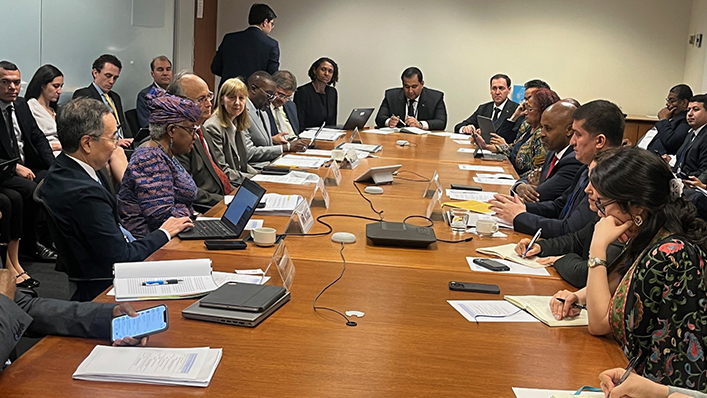
The Director-General stressed that pursuing lasting economic reforms and accession to the WTO required strong political commitment. She highlighted Ethiopia’s economic reforms under Prime Minister Abiy Ahmed Ali’s “Home-Grown Economic Reform Programme” which aimed at structural transformation of the economy and private sector growth. She noted moreover that the reforms have also created an enabling environment for Ethiopia to benefit from its membership in the African Continental Free Trade Area (AfCFTA).
Continued support by President Mirziyoyev of Uzbekistan had also underpinned Uzbekistan’s reform programme, DG Okonjo-Iweala said. Key presidential decrees had aimed to reduce exclusive rights in several sectors and address other issues of concern to WTO members, while a Presidential Decree in March replaced export restrictions with export duties. This makes the export regime more predictable and transparent, the Director-General noted.
She also took the opportunity to thank both WTO members and multilateral institutions such as the IMF and World Bank for their assistance in helping build institutional capacity and provide training to acceding governments. The fact that large economies like Ethiopia and Uzbekistan wish to join the WTO reaffirmed the continued importance of the organization and the stability and predictability provided by the multilateral trading system. The Director-General’s comments are available here.
World Bank and IMF representatives lent their support to domestic reforms being undertaken by Ethiopia and Uzbekistan and looked forward to their accession to the WTO.
Antonella Bassani, World Bank Vice President for Europe and Central Asia, noted that Uzbekistan had emerged as one of the top reformers worldwide, having completed over 200 domestic legal reforms since 2020. There was an expectation that Uzbekistan was in the final stretch of its WTO membership negotiations. Ms Bassani said WTO accession remained critical for emerging and developing economies and the World Bank was ready to support the process.
Amit Dar, World Bank Acting Vice President for the Eastern and Southern Africa Region, highlighted the reforms undertaken by Ethiopia. He acknowledged that challenges remain, particularly in the areas of state-owned enterprises, competition, intellectual property rights, trade facilitation and subsidies. He emphasized that the World Bank remains fully committed to supporting Ethiopia through providing technical assistance and resources to help Ethiopia achieve its WTO membership goals and deepen its integration into world markets.
Kenneth Kang, Deputy Director, Strategy, Policy and Review Department of the IMF, stressed the importance of structural reforms for generating a predictable and stable trade policy environment and the need for careful macroeconomic management and commended both countries on their progress. He noted that economic reforms during the accession process had a positive impact on economic growth. This has been demonstrated in a recent joint study by IMF and WTO staff that showed economies that made deeper commitments during their accession processes grew on average 1.5 percentage points faster than they otherwise would have done.
Highlighting the economic and legislative reforms undertaken by their respective countries, representatives from Ethiopia and Uzbekistan reaffirmed their countries’ commitment to conclude accession negotiations by MC14, to be held in Cameroon in March 2026.
Ethiopia’s State Minister for Finance Eyob Tekalgn said that WTO accession was important for further accelerating economic reforms. Ethiopia’s membership of the AfCFTA had also anchored its reform programme. He also pointed to the need for financial support to build capacity, notably for negotiations and implementation of reforms and to bring legislation into conformity with WTO rules. He added that Ethiopia was working actively to complete bilateral market access negotiations and hoped to conclude these shortly.
Uzbekistan’s Chief Negotiator Azizbek Urunov noted key steps taken recently, including bringing its food and product safety rules in line with the WTO agreements. To date, nearly 120 legal acts had been harmonized with WTO agreements, he said, with various other draft laws expected to become law soon. Regarding privatization, Mr Urunov noted that Uzbekistan is on course to meet its goal of increasing the share of the private sector in the economy to 85 per cent by 2030.
Both representatives indicated they were ready to take all the remaining necessary steps to complete their respective reform programmes and become WTO members.
WTO accessions of Ethiopia and Uzbekistan
Ethiopia held its 5th Working Party meeting on 19 March 2025. More information on Ethiopia’s accession is available here.
Uzbekistan held its 9th Working Party meeting on 5 and 6 December 2024. More information on Uzbekistan’s accession is available here.
Share
Reach us to explore global export and import deals